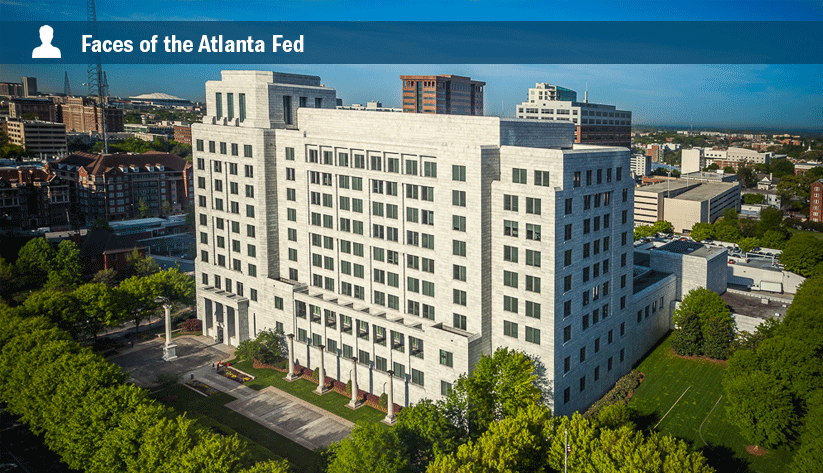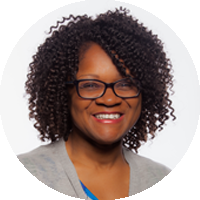
Community and economic development was Sameera Fazili's bailiwick long before she arrived in Atlanta two years ago.
Fazili, a senior visiting adviser in the Community and Economic Development (CED) group at the Atlanta Fed, has spent her career promoting economic opportunity for all. Her work in human rights, financial inclusion, and public policy has taken her to Asia, the Middle East, and Europe, as well as to assignments at the U.S. Treasury Department and even the White House, where she spent nearly two years on the National Economic Council as a senior policy adviser.
After college, she enrolled in medical school, initially intending to work in refugee camps. But after doing some human rights work, she realized she wanted to devote her time to preventing conflict as opposed to addressing its effects.

Photo by David Fine
"I saw economic development as the route to peace for a lot of people," Fazili says. "The cause of a lot of conflict was people not having their basic needs met."
Thinking globally, working locally
Now, Fazili sees an opportunity to lay some groundwork for inclusive growth in the Atlanta Fed's diverse region, where financial plenitude and economic want coexist cheek to jowl. "National data continues to show that the Southeast remains a part of the country where people are least likely to move out of poverty if they are born into it," she says. "There is so much need for people to think really hard about how to design systems that will support access to opportunities for all."
Fazili, who had never lived in the U.S. South before coming to Atlanta, has devoted a lot of time to becoming familiar with the Atlanta Fed's area, the Sixth District, which includes Georgia, Florida, Alabama, and parts of Louisiana, Mississippi, and Tennessee. She has traveled regionally to talk with business owners, those who run nonprofit agencies, and others, and these people routinely cite lower educational attainment and affordable housing as major barriers to more broad-based economic growth. "I recognize that you often have to deal with the quirks of an economy at the local level to really create the opportunity for growth," Fazili says.
In the Atlanta Fed's CED group, which seeks to foster economic growth in low- and moderate-income communities, Fazili has found her niche.
"She is strong at building bridges and reaching out to diverse audiences," says CED assistant vice president Karen Leone de Nie, who oversees Fazili's efforts. "She has a deep national network, and her range of community development expertise positions her to respond to a lot of different issues."
Putting lifelong lessons into practice
A native of Buffalo, New York, Fazili—along with her brother and two sisters—grew up in a household that valued hard work, education, and community service. Her parents, both doctors, immigrated to the United States from northern India's war-torn Kashmir region. "My parents grew up in very humble circumstances and were only able to move up the economic ladder because they had an education," Fazili says. For her part, Fazili earned a bachelor's degree in social studies at Harvard and a law degree from Yale.
A mother of two boys, Fazili is maintaining her devotion to community service. She and her husband, a doctor, are active volunteers in their local community. Having studied consumer, business, and housing finance, Fazili has learned that expanding economic opportunity is a multipronged initiative, with government, business, and the nonprofit and philanthropic sectors all playing a role. Quality jobs need to be available, but so too does the training that gives people the ability to access employment, adequate housing, and transportation, she says.
During a stint as a lecturer at Yale Law School, Fazili helped start a community development bank in New Haven, Connecticut, that serves consumers and small businesses in minority and low-income neighborhoods. She also played a leading role in New Haven's response to the foreclosure crisis.
She says her time at the U.S. Treasury Department, where she worked as a senior policy analyst for domestic finance and as a senior adviser in international affairs, marked a career high point. From 2010 to 2011, she helped design programs that sought to revitalize credit markets in low- and moderate-income areas in the wake of the recession. From 2011 to 2013, Fazili regularly attended G-20 (Group of Twenty) summits of the world's most developed economies as she supported policy responses with the International Monetary Fund to the European financial crisis. "I got to have a front-row seat in the international financial system," Fazili says. "It was a once-in-a-lifetime experience."
While a member of the White House's National Economic Council, Fazili worked on strengthening protections in the retirement savings markets, where research had indicated that middle-class families were losing billions of dollars annually to hidden fees.
Fazili's experience in public policy, housing, and finance made her an ideal choice for the external advisory group of the Andrew Young School of Policy Studies at Atlanta's Georgia State University, says Mary Beth Walker, an economics professor who is associate provost for strategic initiatives and innovation at the school. In fact, former Atlanta Fed president Dennis Lockhart recommended Fazili to the advisory panel, and Walker says she brings many interesting ideas to the group. "It's so unusual to have a broad set of experiences when you're so young," she said.
Fazili is currently conducting research on efforts under way in the national and regional health care sector to promote economic inclusion, chronicling hospitals and health insurance companies that are offering loans and grants to develop affordable housing, for example. "I hope my research will help spark further partnerships between healthcare companies and community development organizations in our district," she says.




